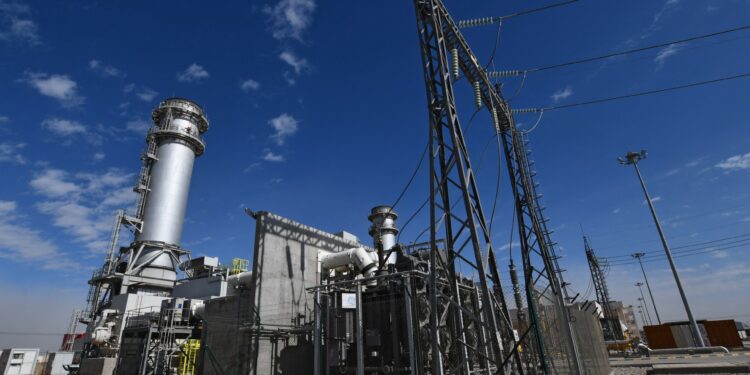Al -Jazeera Net Correspondents
Baghdad– In a move described as historical, Iraq signed last Wednesday strategic understandings in the electricity sector, aiming to address the crisis of power outages that have been overdue for decades.
The first, as Baghdad signed a memorandum of understanding with the American company “GE Vernewava”, and aims to add 24 thousand megawatts of gas energy to the national network.
As for the fortress, Baghdad fell with the American “UGT Renabeel” group to create an integrated solar energy project with a production capacity of 3 thousand megawatts, in addition to a comprehensive infrastructure update, with international funding and an affirmation of technology transfer.
Promoting energy independence
These two understandings come at a critical timing, as Iraq seeks to enhance its local fence in energy production, after the United States announced the end of the exception that it was giving it to Baghdad to import gas from Iran.
Tehran provides Iraq by about 50 million cubic meters of gas per day, covering about a third of the country’s energy needs, and it is sufficient to produce between 6 to 7 thousand megawatts of electricity.
“GE Verennova” .. 24 thousand megawatts
Iraqi Minister of Electricity, Ziyad Ali Fadel, confirmed in exclusive statements to “Al -Jazeera Net”, that the agreement with “GE Vernewava” constitutes a pivotal shift in endeavors to end the chronic electricity crisis, explaining that it will add 24 thousand new megawatts by creating highly efficient electrical stations operating with multiple types of fuel.
The minister indicated that 7700 megawatts of this capacity will be generated with the technology of the complex cycle, and provides additional production with high efficiency and reduces fuel consumption.
He explained that the details of the costs and time schedules of the project will be determined when signing the final contract, as the current agreement represents a preliminary framework that includes the technical and financial aspects of the full contract.
The minister praised the experience of the company “GE Verrenova”, previously known as “General Electric”, describing it as “one of the major companies globally in the field of energy generation and transportation, and is currently contributing to the production of about 25% of electricity worldwide.”
He stressed that the Iraqi government has been included, since its formation, a clear strategy to diversify energy sources and modernize the electrical infrastructure, considering that the agreement with “Virneva” represents a “pivotal step towards achieving these goals, and ending the suffering of the citizen with repeated interruptions”, as well as strengthening economic and technical relations with the United States.
Clean sustainable energy
As for the second agreement signed with the American “UGT Renaobel” group, it includes the establishment of a 3,000 -megawatt solar energy project, in addition to developing the necessary infrastructure, as part of a plan aimed at expanding dependence on renewable energy sources.
According to the Ministry of Electricity statement, the project will include a transfer of technology and the training of Iraqi cadres, with international funding, and aims to reduce dependence on fossil fuels and achieve Iraq’s climatic goals in reducing emissions.
Still challenges still exist
Despite the great ambition of these agreements, energy experts point to deep challenges that may hinder the full implementation of the declared goals. Energy expert Bilal Khalifa confirms that the timing of the signing of the agreement may be linked to the directions of US President Donald Trump seeking to push his allies to invest in American companies, but he warned that the electricity sector in Iraq suffers from structural problems in all its stages: from obstetrics to transportation and then distribution.
Khalifa told Al -Jazeera Net: “Iraq suffers in the summer from an electric deficit between 10 to 12 thousand megawatts, despite the statements of the Ministry of Electricity that production reaches 27 thousand megawatts,” noting that actual production does not exceed 18 thousand megawatts at the present time.
He also pointed out that “the problem of transportation has not been treated yet, and the distribution networks inside the cities suffer from a severe worn and a rise in consumption as a result of urban expansion,” adding that “the problem of weak collection, especially from companies and government ministries, weakens the sector’s ability to modernize and maintains.”
Gas crisis … renewed knot
One of the most prominent obstacles referred to by Khalifa is the lack of natural gas, as Iraq consumes approximately 70% of its production of associated gas, which is about two billion standard cubic feet per day. As for the new stations, they need 5 billion standard cubic feet per day, a number that is difficult to achieve even with the resumption of import from Iran.
Khalifa suggested thinking about more sustainable alternatives, such as importing gas from Qatar through a wild or marine tube to avoid the cost of liquefied gas, with warning that operating stations with heavy fuel or crude oil will raise the costs of maintenance and negatively affect Iraq’s share of oil production within OPEC.
In a sign, the energy expert hinted that the agreement with American companies may be caused by political pressure from the administration of President Trump, who has previously called for strengthening foreign investments in the American market, considering that “Iraq may seek through this agreement to avoid possible negative decisions from Washington.”



